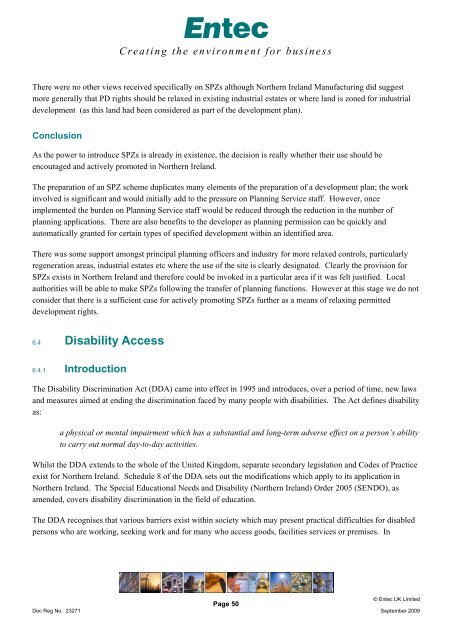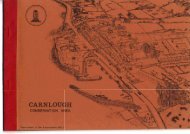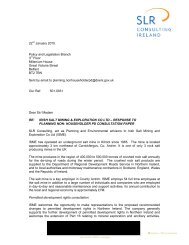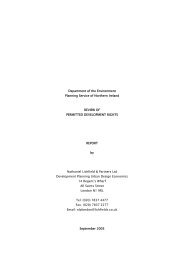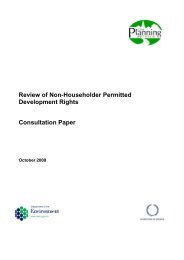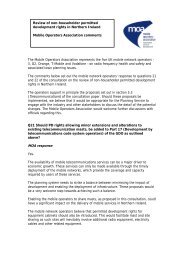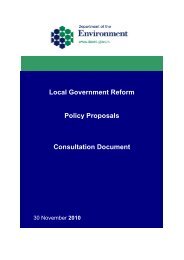Non-householder - Report - The Planning Service
Non-householder - Report - The Planning Service
Non-householder - Report - The Planning Service
Create successful ePaper yourself
Turn your PDF publications into a flip-book with our unique Google optimized e-Paper software.
Creating the environment for business<br />
<strong>The</strong>re were no other views received specifically on SPZs although Northern Ireland Manufacturing did suggest<br />
more generally that PD rights should be relaxed in existing industrial estates or where land is zoned for industrial<br />
development (as this land had been considered as part of the development plan).<br />
Conclusion<br />
As the power to introduce SPZs is already in existence, the decision is really whether their use should be<br />
encouraged and actively promoted in Northern Ireland.<br />
<strong>The</strong> preparation of an SPZ scheme duplicates many elements of the preparation of a development plan; the work<br />
involved is significant and would initially add to the pressure on <strong>Planning</strong> <strong>Service</strong> staff. However, once<br />
implemented the burden on <strong>Planning</strong> <strong>Service</strong> staff would be reduced through the reduction in the number of<br />
planning applications. <strong>The</strong>re are also benefits to the developer as planning permission can be quickly and<br />
automatically granted for certain types of specified development within an identified area.<br />
<strong>The</strong>re was some support amongst principal planning officers and industry for more relaxed controls, particularly<br />
regeneration areas, industrial estates etc where the use of the site is clearly designated. Clearly the provision for<br />
SPZs exists in Northern Ireland and therefore could be invoked in a particular area if it was felt justified. Local<br />
authorities will be able to make SPZs following the transfer of planning functions. However at this stage we do not<br />
consider that there is a sufficient case for actively promoting SPZs further as a means of relaxing permitted<br />
development rights.<br />
6.4 Disability Access<br />
6.4.1 Introduction<br />
<strong>The</strong> Disability Discrimination Act (DDA) came into effect in 1995 and introduces, over a period of time, new laws<br />
and measures aimed at ending the discrimination faced by many people with disabilities. <strong>The</strong> Act defines disability<br />
as:<br />
a physical or mental impairment which has a substantial and long-term adverse effect on a person’s ability<br />
to carry out normal day-to-day activities.<br />
Whilst the DDA extends to the whole of the United Kingdom, separate secondary legislation and Codes of Practice<br />
exist for Northern Ireland. Schedule 8 of the DDA sets out the modifications which apply to its application in<br />
Northern Ireland. <strong>The</strong> Special Educational Needs and Disability (Northern Ireland) Order 2005 (SENDO), as<br />
amended, covers disability discrimination in the field of education.<br />
<strong>The</strong> DDA recognises that various barriers exist within society which may present practical difficulties for disabled<br />
persons who are working, seeking work and for many who access goods, facilities services or premises. In<br />
Doc Reg No. 23271<br />
Page 50<br />
© Entec UK Limited<br />
September 2009


